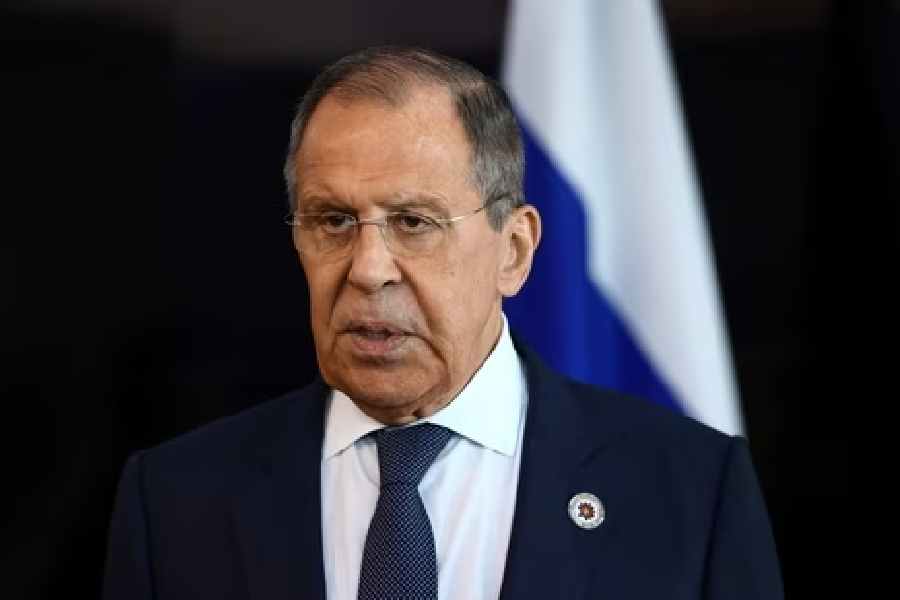Russia and the Western powers on Sunday claimed vindication of each other's respective positions on the Ukraine crisis at the G20 Summit a day after the grouping under India's presidency unveiled a declaration with consensus that avoided condemning Moscow for its invasion of the eastern European country.
At a media briefing, French President Emmanuel Macron said the G20 leaders' declaration "confirms" Russia's isolation for its attack on Ukraine and that the bloc is committed to "just and lasting" peace in the war-torn country.
In a separate press conference, Russian Foreign Minister Sergey Lavrov said the West failed to "Ukrainize" G20 largely due to the efforts by the developing countries.
However, both Russia and the Western powers complimented India for building consensus on the text relating to the Ukraine conflict in the leaders' declaration.
"The summit was a breakthrough event as it gave clear guidelines for achieving such goals (of ensuring a balance of interests in the global economy)," Lavrov said, hailing India's presidency of the grouping.
The G20 leaders adopted the New Delhi declaration by consensus on Saturday while avoiding mentioning the Russian invasion of Ukraine, in what was largely seen as a climbdown by the Western powers on the conflict.
The declaration issued at the G20's Bali summit last November had deplored in the strongest terms the Russian aggression against Ukraine while most members strongly condemned the war.
In his remarks, the Russian foreign minister said the united position of the Global South prevented the West from focusing the G20 summit's agenda on Ukraine.
"Largely thanks to the consolidated position of the Global South on protecting its legitimate interests, Western attempts to focus the agenda on Ukraine to the detriment of discussing the pressing issues the developing world is facing failed," he said.
Lavrov said India has for the first time in the history of the G20 managed to consolidate representatives of the Global South.
He said the G20 developing countries have a "correct picture" of what is going on in Ukraine, alleging that "the Kiev regime destroyed its country's territorial integrity by itself." In his comments, Macron said the G20 is not a forum for political discussions and that a "vast majority" of countries of the grouping have "condemned" the Russian invasion of Ukraine.
"This G20 confirms once again the isolation of Russia. Today, an overwhelming majority of G20 members condemn the war in Ukraine and its impact," Macron said.
As G20 President, India did its best to send across a message of unity and peace to the world while Russia was still waging its aggression against Ukraine, Macron said.
The French President said the declaration referred to the need of upholding principles of sovereignty and territorial integrity, and called on all states to refrain from the "threat, or use, of force" to seek territorial acquisition.
He said the G20 is committed to "just and lasting" peace in Ukraine.
In a separate press conference, Japanese Prime Minister Fumio Kishida said Russia's "invasion" of Ukraine is something that is "shaking" the foundation of cooperation at G20.
"Russia's aggression in Ukraine is shaking the very foundation of cooperation at the G20...Further, it is causing enormous impact to the world economy through factors such as protracted rise of food and energy prices," he said.
"Today, as the world faces a complex crisis, collaboration at the G20 as a premier forum for economic cooperation is becoming increasingly important," Kishida said, speaking in Japanese.
"That is having a major impact on the global economy," he said.
The declaration issued at the G20's Bali Summit last November had deplored in the strongest terms the Russian aggression against Ukraine while most members strongly condemned the war.
The New Delhi G20 Declaration refers only to the "war in Ukraine" and noted with "deep concern the immense human suffering and the adverse impact of wars and conflicts around the world." In reference to the Ukraine conflict, it also has a line that "there were different views and assessments of the situation." Both Russia and China had agreed to the two paragraphs on the Ukraine conflict in the Bali declaration, but they backtracked from it this year creating difficulties for India.
Except for the headline, this story has not been edited by The Telegraph Online staff and has been published from a syndicated feed.











